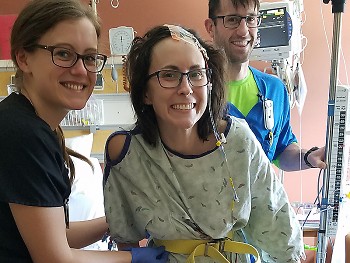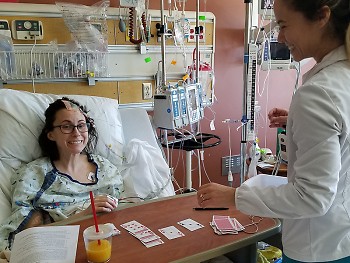“I don’t know that I’ve ever in my life depended on somebody else that much. You can’t get through something like this alone.”
On the morning of March 17, 2018—St. Patrick’s Day—life took an abrupt turn for Marcia. A ruptured aneurysm and subsequent stroke turned what was supposed to be a day of celebration into a fight for her life.
“I just clearly remember this sudden headache and severe pain and spasm down the back of my neck,” Marcia recalls. It felt like the worst headache of her life. She told her husband Dave, “You need to get me to the ER, and take me to Metro.” Marcia is a neurosurgery physician assistant. “Initially when the doctor told me I had suffered an aneurysm, I started to cry,” she remembers. “You immediately think, ‘I’m going to die.’”
Support is everything
For patients and their loved ones, there’s nothing more terrifying or emotionally challenging as the days and weeks after a stroke or aneurysm. Marcia and Dave agree, you need support. “I could go on and on for hours just telling stories about the things that people did for us that really got us through,” Marcia says.
“Don’t be afraid to count on people,” Dave adds. “If they ask if you need anything, be honest. Lean on your support system.”
Metro Health hosts a monthly support group of the Joe Niekro Foundation, an organization committed to supporting survivors of strokes and aneurysms and their families. “We know when someone suffers a stroke, it places a huge burden on families and caregivers,” says Metro Health neurointerventional radiologist Augusto Elias, MD. “There can be feelings of depression and guilt for both patients and their caregivers. The Joe Niekro Foundation Support Group is a community of people who have all experienced similar circumstances, and together, they can find commonalities, share advice and learn.”
Patience is key
As a patient, it’s important to take your recovery one day at a time. “I am used to being the caregiver and not being the one who needed to be taken care of. And that was really hard,” Marcia admits. She hated being confined to her room with limited mobility, but taking it slowly was essential for her recovery. She also learned to delegate responsibilities to others.
“We had to have people help us with making sure the kids got to school,” she explains. “Nights when Dave stayed with me, we had friends who would stay at our house with the kids and make sure they ate dinner. It was just incredible.”
Caregivers need care too
Dave could never have anticipated how much time and energy would be spent caring for Marcia, communicating with nurses and physicians, going back and forth from home and the hospital—all while keeping family and friends informed. Dave needed support too.
“That’s where Marcia’s sister Maureen jumped in.” Dave explains. “She was my voice, if you will. She was Marcia’s voice. She knew how to take control of things that I couldn’t.”
“She stepped up and took care of him during those times when he needed a shoulder. Because this doesn’t just happen to the patient, it happens to the whole family, and he needed somebody to be there for him too,” Marcia adds.
Reach out to your care team
“The physicians, nurses, case workers and hospital staff are always there to help you,” Elias emphasizes. “We understand what you’re going through, and we know it’s tough. We want to answer your questions and provide a sincere and realistic picture of how you or your loved one is doing.”
Elias says it’s his goal with all patients to treat them as if they were his own family member. “That’s my commitment to you as a doctor,” he asserts. “At Metro Health, you will always find empathetic and compassionate care.”
Focus on the small victories
Rehabilitation after an aneurysm or stroke can be a long process with slow and sometimes erratic progress. Elias suggests that patients focus on capabilities rather than limitations. “Encourage patients when they accomplish something new, no matter how small,” says Elias. “It’s easy to get frustrated, and that’s when family members need to step in and remind patients of how far they’ve come and what they have to live for.”
Eventually all of her small victories led to a nearly full recovery for Marcia. She knows she’s one of the lucky ones, and attributes that to the expertise and care of Metro Health’s Comprehensive Stroke Center team. “I’m just super grateful to everybody in that neurointerventional radiology suite who kept going throughout my surgery. I wouldn’t be here today if they hadn’t.”
To watch Marcia's full journey to recovery visit metrohealth.net/stroke.
The Rapidian, a program of the 501(c)3 nonprofit Community Media Center, relies on the community’s support to help cover the cost of training reporters and publishing content.
We need your help.
If each of our readers and content creators who values this community platform help support its creation and maintenance, The Rapidian can continue to educate and facilitate a conversation around issues for years to come.
Please support The Rapidian and make a contribution today.


